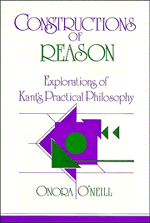7 - Universal laws and ends-in-themselves
Published online by Cambridge University Press: 05 June 2012
Summary
Kant's Groundwork is the most read and surely the most exasperating of his works on practical philosophy. Both its structure and its arguments remain obscure and controversial. A quick list of unsettled questions reminds one how much is in doubt. The list might include the following:
Why does Kant shift the framework of his discussion three times in a short work?
Does he establish that there is a supreme principle of morality?
Does he show that the Categorical Imperative is that supreme principle?
Does he show that human beings are free agents for whom such principles of morality are important?
What is the relationship between the various apparently distinct formulations of the Categorical Imperative?
To what extent are any (or all) of them action-guiding?
This chapter concentrates on the last two of these questions. It is mainly about the equivalence of the various formulations of the Categorical Imperative; it also sketches ways in which the Categorical Imperative can guide action. I shall comment only on three significantly different formulations, the Formula of Universal Law (FUL), the Formula of the End-in-Itself (FEI) and then (more briefly) the Formula of the Kingdom of Ends (FKE).
By way of reminder the three formulations may be stated:
FUL: “Act only on that maxim through which you can at the same time will that it should become a universal law” (G, IV, 421).
- Type
- Chapter
- Information
- Constructions of ReasonExplorations of Kant's Practical Philosophy, pp. 126 - 144Publisher: Cambridge University PressPrint publication year: 1990
- 2
- Cited by



